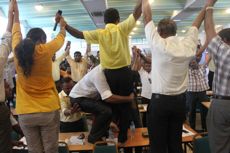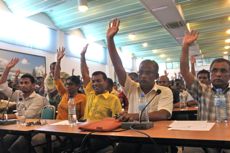“I call upon Dr Waheed to immediately step down from the seat he is sitting in and call for immediate elections,” said former President Mohamed Nasheed during a Maldivian Democratic Party (MDP) National Council meeting at Dharubaruge this afternoon.
The council further rejected the now-forming national unity government’s invitation to join forces, and declaring Nasheed’s former government the only “legitimate” government said it would not negotiate with the opposing ruling body.
Nasheed spoke to hundreds of party supporters packed into the entire top floor of Dharubaruge, along with the sitting members of the national council. MP ‘Reeko’ Moosa Manik chaired the meeting.
Declaring that “I will never back down until a lawful legitimate government is sworn in,” Nasheed called upon the chief justice to investigate the yesterday’s coup “and bring those responsible to justice.”

“We will never allow the national defense forces and the police to be hijacked by the opposition,” he said. “We will assure our key pledges of affordable housing, transport networks, closure of the doors opened towards narcotics, and bringing down the commodity prices.”
According to MDP, Nasheed was yesterday forced to resign by the military, which forced the state broadcasting station MNBC to revert to its identity Television Maldives (TVM) and threatened “a bloodbath in the capital” if Nasheed did not step down from the presidency.
The alleged coup arose out of three weeks of opposition-led protests calling for the release of Criminal Court Chief Judge Abdulla Mohamed who was arrested on January 16 after attempting to block his own police summons. Protesters declared the arrest a violation of human rights while members of former president Maumoon Abdul Gayoom’s opposition Progressive Party of the Maldives (PPM) accused Nasheed of acting unlawfully.
Following an all-night protest on February 6, under 100 police officers defected from their position as state security and assisted protesters in an attack on the then-ruling MDP camp, triggering a larger clash between police and Maldives National Defense Forces (MNDF) last morning which left many injured.
Following Nasheed’s resignation at 1:00 pm, former Vice President Dr Mohamed Waheed Hassan was sworn into office yesterday at 3:00pm with the support of several opposition parties. He said he intends to fulfill Nasheed’s term until the scheduled presidential elections in 2013.
Meanwhile, members of Nasheed’s government have said they did not attend work today and are awaiting political appointment.
Gathering for the council meeting today at Dharubaruge, throngs of MDP supporters and members of the former government chanted for Nasheed upon his arrival, filling the building’s top floor and screaming in support as sitting council members declared resistance to Dr Waheed’s national unity government.
MP Alhan Fahmy, former Foreign Minister Ahmed Naseem and several party MPs said MDP would not negotiate with Dr Waheed’s government and declared that Nasheed “is still the legitimate president.”
Party President Dr Ibrahim Didi, who last night said on television that he supported cooperation with the new government, told the council, “I was misinterpreted by the media stating that I was open to the idea of a unity government but I only stated that I would decide after consulting the party council.”
 Speaking from atop her chair at the front of the council MP Mariya Ahmed Didi declared yesterday’s events a coup and called on the council to accept that Nasheed’s administration had been elected by popular vote, but was overturned by a minority of the nation’s security forces.
Speaking from atop her chair at the front of the council MP Mariya Ahmed Didi declared yesterday’s events a coup and called on the council to accept that Nasheed’s administration had been elected by popular vote, but was overturned by a minority of the nation’s security forces.
Former State Minister for Foreign Affairs Aslam Shakir next proposed a resolution that the MDP rally for judicial reform, which was earlier scheduled for February 17, would proceed as planned. Many party supporters are due to arrive from islands for the event.
The council unanimously voted in favor of both resolutions.
The council further asserted that it does not recognise yesterday’s change of government, and that Nasheed and his ministers are still the legitimate ruling body in the eyes of MDP.
As the meeting drew to a close Nasheed said, “I call upon all of us to march to ‘Haruge’ [MDP camp] after this meeting and open it for it was the place where freedom of speech and expression originated.” Supporters exited the building chanting “long live Nasheed!” and made their way to the party camp.
Shortly after, MDP members clashed with some opposition supporters near the Maldives Monetary Authority (MMA). MNDF forces were on their way to the scene at time of press, after the crowd had been four times pepper sprayed.
Nasheed was reported to be on the protest’s front lines.
 (0)Dislikes
(0)Dislikes (0)
(0)